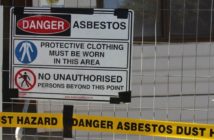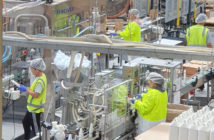WorkSafe has released guidance for managing and removing asbestos in the workplace, the first of its kind in New Zealand. 
The Approved Code of Practice for the Management and Removal of Asbestos will help contribute to WorkSafe’s target of a 50 percent reduction in asbestos-related disease by 2040.
Asbestos is the single biggest cause of deaths from work-related disease. On average about 170 people die every year from asbestos-related diseases.
Breathing in airborne asbestos fibres is a serious risk to health – once the fibres are breathed in, they lodge in the lungs and may cause asbestosis, lung cancer or mesothelioma.
Designed for the web so that it can be used on the go, the code was developed in consultation with unions, employer organisations, other key stakeholders and the public.
WorkSafe received the most responses for any guidance consultation in its history,” says WorkSafe chief executive, Gordon MacDonald.
“By working together with industry, we were able to establish a common view of what ‘good’ looks like. This lessens the need for businesses to obtain independent advice, which may reduce compliance costs.”
Previous asbestos guidance focused only on asbestos removal, while this code is applicable to a more comprehensive range of people who are exposed to asbestos.
The code sets out WorkSafe’s expectations for working safely with asbestos and is designed for businesses that manage or control workplaces, carry out asbestos removal, or asbestos-related work, and licensed asbestos assessors. The code applies to landlords too, but not to home occupants doing DIY.
Included is information and guidance on keeping safe around asbestos, like the types of work allowed when working with asbestos, how to identify and manage asbestos and asbestos-containing material in the workplace, prohibited and restricted tools and equipment, personal protective equipment and health monitoring.
The code is designed to reflect the requirements set out in the Health and Safety at Work (Asbestos) Regulations 2016 and the Health and Safety at Work (General Risk and Workplace Management) Regulations 2016.
It became illegal to import blue and brown asbestos in its raw form from 1984 and asbestos-containing products on 1 October 2016.
Buildings built, altered or refurbished from 1940 until the mid-1980s are likely to contain asbestos.
The code is available online here



